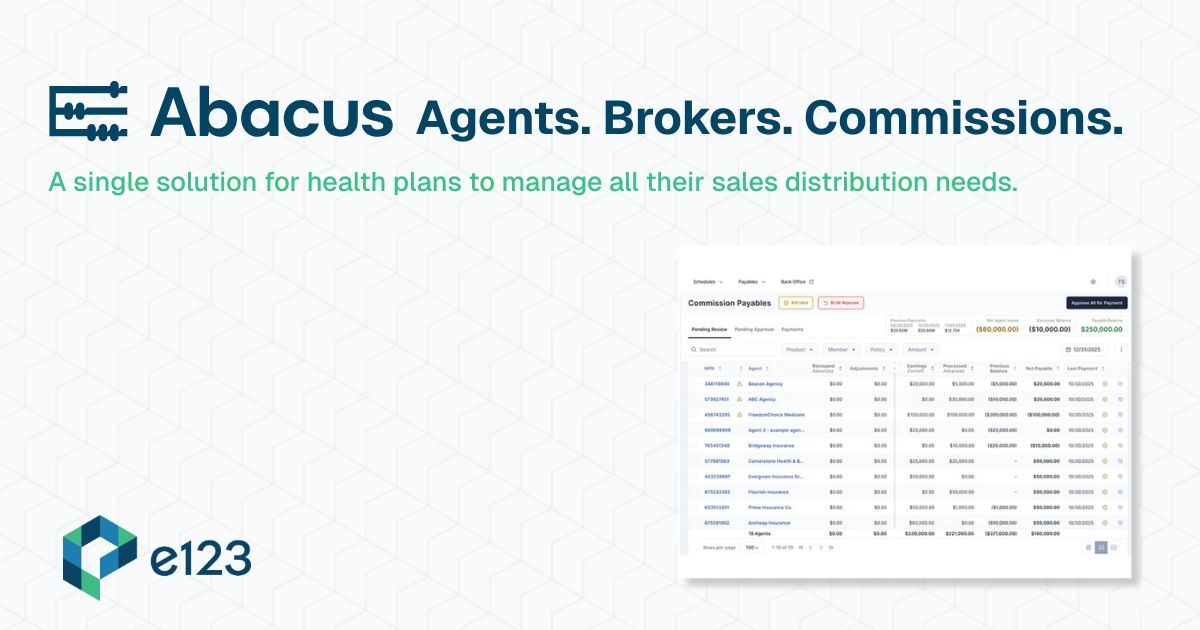
Steve Trattner is the President of America’s Healthcare Plan (AHCP), a large Field Marketing Organization (FMO) with thousands of agents and agencies across the country selling Affordable Care Act (ACA), short-term medical, ancillary health, Medicare Advantage, Medicare supplement, and more. AHCP was acquired by Allstate Health 10 years ago. Steve joined Alan Edgin on e123’s Insurance Innovation Podcast to discuss the topic “Are Commissions Killing Your Organization?” to share his unique perspective from both the FMO and carrier side.
The FMO Perspective on Commissions
FMOs, according to Steve, need to be experts across a multitude of carriers, products, and all the systems necessary to support those agencies. Whether an agency has 2 or 200 agents, an FMO needs to support agencies through every stage of growth to help them run their businesses.
In Alan’s experience working for a large insurance distribution channel, he would get calls from FMOs saying “Your commission payments are killing me!” because carriers would expect them to accept some margin of error as inevitable. But agents not getting a proper commission check is like employees not getting paid because they have bills to pay and expect proper, timely payments.
As AHCP is a FMO that distributes their parent company’s health plans, Steve can easily relate to each point of view. “It’s no surprise that agents are very sensitive to commission issues,” he says. “If an FMO doesn’t have a near-perfect system for processing commissions, they will be constantly disappointing agents. You have to know what is being processed every week, with chargebacks, and advanced balances across multiple carriers, hierarchies, and commission schedules. There are way too many moving parts to leave this up to an Excel spreadsheet.”
e123 Commissions for Carriers offers significant flexibility to automate and customize commissions for agency owners and downline agents. With the right system, Steve says that it shouldn’t take an entire team to process commissions even with tens of millions of dollars of commissions each week. And the best systems are even beginning to solve the most challenging aspects of commissions – advanced balances and chargebacks.
The Strategic Impact of Commissions
76% of agents report they would do more business with carriers that are easy to do business with. Agencies and carriers need to be able to quickly change commission structures to match new CMS regulation and those that can’t respond quickly will struggle. Steve says, “I have no doubt that our ability to meet the more difficult challenges of commissions helps us retain agents.”
How carriers pay commissions can be a competitive advantage because many carriers rely on antiquated commission processing systems. Inaccuracies such as failing to capture rapid disenrollments not only mean incorrect commissions but also make it difficult for agents to manage their books of business. Inadequate systems, according to Steve, “lead to such dramatic gaps in what is really vital for managing a successful agency and watching your dollars. From the ability to track multi-tier hierarchies, access the data, and the ability to use that data in smart ways, those agent portals are not intuitive or user-friendly.”
It’s impossible for individuals manually processing millions of dollars of commission every week to catch the errors that carriers put through – missing policies, wrong commission schedules, missing bonuses. And multiple legacy systems from a single carrier can compound errors and make commission tracking even more complicated. Steve believes, “the better commission platforms we are seeing can identify and conceivably reconcile erroneous commission payments from the carriers.”
Total Visibility is the Future
The ideal scenario for carriers paying commissions, “isn’t rocket science.” However, the ability for carriers to generate APIs that can provide routine data feeds for transparent data collection is almost non-existent today. Steve believes “If carriers could offer real-time APIs into a common 3rd party platform, that would be an enormous game changer and a huge win for the industry.”
Ultimately a strong commission system should save you time, improve accuracy, and most importantly, drive business decisions. You need data to identify good business from bad business and improve profitability. Mistakes happen, but what agents really want today is an understanding of how commissions are factored, calculated, and processed.
Steve concludes, “10-15 years ago, as long as an agent saw a deposit in their bank account, they were good. Now, they want as much information about their commissions as possible so they can manage their business and they have seen that unfortunately, too many carriers are making mistakes.”
There are signs of promise that the industry is moving in the right direction. In the more competitive ancillary business, carriers need to earn and keep your business so they are much more responsive to brokers. Major medical carriers may be further behind the ancillary providers in commission processing, but with the number of agents shrinking, the pressure to be responsive to agents is increasing.
Be the Carrier of the Future
Transparent, visible, accurate commission data is the future. And it’s a strategic competitive advantage for carriers. You can be the carrier that agents want to work with when you use e123’s Commissions for Carriers. Contact us to learn more.






